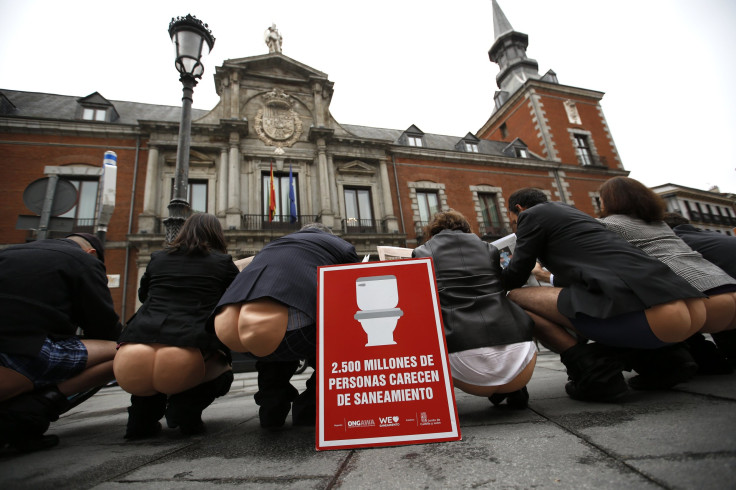World Toilet Day Facts: 7 Startling Truths About Sanitation Around The Globe [VIDEO]

The United Nations has given new meaning to the term potty mouth with World Toilet Day. The celebration's purpose is to raise awareness about the state of hygiene around the globe. At a time when the world’s population continues to swell, mainly in sub-Saharan Africa and South Asia, improving access to adequate sanitation will be key to sustaining healthy human populations, advocates say.
“Now is the time to act,” Michel Jarraud, chair of U.N.-Water and Secretary-General of the World Meteorological Organization, said in a statement. “Water and sanitation must be clear priorities if we are to create a future that allows everyone to live healthy, prosperous and dignified lives.”
Currently, one out of three people on earth lack basic sanitation, namely clean water. It’s a problem that has implications for public health everywhere. Providing people with safe, clean water is one way to help eradicate poverty and hunger, reduce child mortality, improve maternal health and combat infectious disease, according to the U.N.
The United Nations officially recognized World Toilet Day last year, but the day’s history goes back to 2001, when an entrepreneur from Singapore named Jack Sim started a non-profit called the World Toilet Organization. The group’s mission has been to draw attention to sanitation problems in the developing world and to advocate for ways to address those concerns. Here are seven startling facts about the state of sanitation around the globe.
More children die in sub-Saharan Africa and South Asia from diarrhea than Malaria, measles and HIV/AIDS combined. Diarrhea is a leading cause of death for children under 5 years old, according to the World Health Organization. Of the six leading causes of child deaths in poor countries, diarrhea is responsible for 18 percent of them.
The amount of germs in human fecal is staggering. In one gram of human poop, there are 1 million bacteria, 10 million viruses, 100 worm eggs, 1,000 parasite cysts and 50 infectious diseases, according to Rose George, author of “The Big Necessity: The Unmentionable World of Human Waste and Why It Matters.” That’s a lot of opportunities for spreading infection.
More than 2.5 billion people lack aces to improved sanitation. That’s about 35 percent of the world population.
Hundreds of millions of people do not have soap and water to wash their hands with. Human feces is often a source of germs like Salmonella, E. coli and norovirus, which causes diarrhea. Adequate hand-washing is an effective way to prevent the spread of these and other infectious diseases, according to the U.S. Centers for Disease Control and Prevention.
An estimated 1.8 billion people use drinking water that contains fecal matter. Contaminated water can transmit diseases such as cholera, dysentery and typhoid.
One billion people practice open defecation. Last year, U.N. deputy secretary-general Jan Eliasson mentioned open defecation five times during a speech at World Water Week in Stockholm, according to the Guardian. “It is the most natural of human needs,” he said, but “causes enormous problems which relate both to health and dignity." The practice mainly occurs in rural areas.
The U.N. estimates that for every dollar invested in water and sanitation, there is a $4.3 return. Improving sanitation leads to reduced health care costs for individuals and societies as a whole.
© Copyright IBTimes 2024. All rights reserved.






















